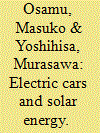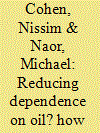| Srl | Item |
| 1 |
ID:
101398


|
|
|
|
|
| Publication |
2011.
|
| Summary/Abstract |
We examined the co-evolution of the transportation, and electricity and heat generation sectors in the Netherlands until 2040 using a MARKAL bottom-up cost optimisation model.
All scenario variants investigated indicate a switch away from crude oil-based diesel and petrol for transportation. Lowest overall CO2 abatement cost is achieved by accommodating transportation first and using relatively expensive options for emissions reduction in electricity generation if needed.
Biomass and carbon capture and storage (CCS) are used to full potential. Transportation CO2 emissions are reduced by switching to ethanol or bio-based synthetic fuels combined with CCS, and series hybrid cars if needed. Depending on the availability of biomass and carbon storage capacity, electricity is produced from biomass, coal with CCS, or wind complemented with natural gas. Indirect greenhouse gas emissions rise to 34-54% of national emissions in 2040.
The difference in annual investment required between the scenario variants with and without CO2 emissions reductions of 68% by 2040 is 4-7 billion euro/year, or 0.5-1.2% of projected GDP.
Investment costs are mostly determined by the cost of cars and electricity generation capacity. We observe competition for limited biomass supply and CO2 storage capacity between the transportation and power sectors.
|
|
|
|
|
|
|
|
|
|
|
|
|
|
|
|
| 2 |
ID:
093336


|
|
|
| 3 |
ID:
105757


|
|
|
|
|
| Publication |
2011.
|
| Summary/Abstract |
Climate change and global resource shortages have led to rethinking traditional individual mobility services based on combustion engines. As the consequence of technological improvements, the first electric vehicles are now being introduced and greater market penetration can be expected. But any wider implementation of battery-powered electrical propulsion systems in the future will give rise to new challenges for both the traditional automotive industry and other new players, e.g. battery manufacturers, the power supply industry and other service providers. Different application cases of electric vehicles are currently being discussed which means that numerous business models could emerge, leading to new shares in value creation and involving new players. Consequently, individual stakeholders are uncertain about which business models are really effective with regard to targeting a profitable overall concept. Therefore, this paper aims to define a holistic approach to developing business models for electric mobility, which analyzes the system as a whole on the one hand and provides decision support for affected enterprises on the other. To do so, the basic elements of electric mobility are considered and topical approaches to business models for various stakeholders are discussed. The paper concludes by presenting a systemic instrument for business models based on morphological methods.
|
|
|
|
|
|
|
|
|
|
|
|
|
|
|
|
| 4 |
ID:
121314


|
|
|
|
|
| Publication |
2013.
|
| Summary/Abstract |
Policy entrepreneurs are individuals who exploit an opportunity in order to influence political results for their own benefit. We use the policy entrepreneurship literature as a theoretical lens for understanding how local players in the policy arena can use a national security agenda in order to promote an energy policy they desire. Using a case study approach, we explain how an Israeli electric vehicle company, Better Place, identified Israel's acute national security priority to cut its dependence on oil and leveraged it, along with environmental arguments, to make the case for their approach to transportation. Our analysis also demonstrates how policy entrepreneurs collaborate with Israeli bureaucrats, senior politicians and lobbying groups to create a national shift toward electric cars.
|
|
|
|
|
|
|
|
|
|
|
|
|
|
|
|